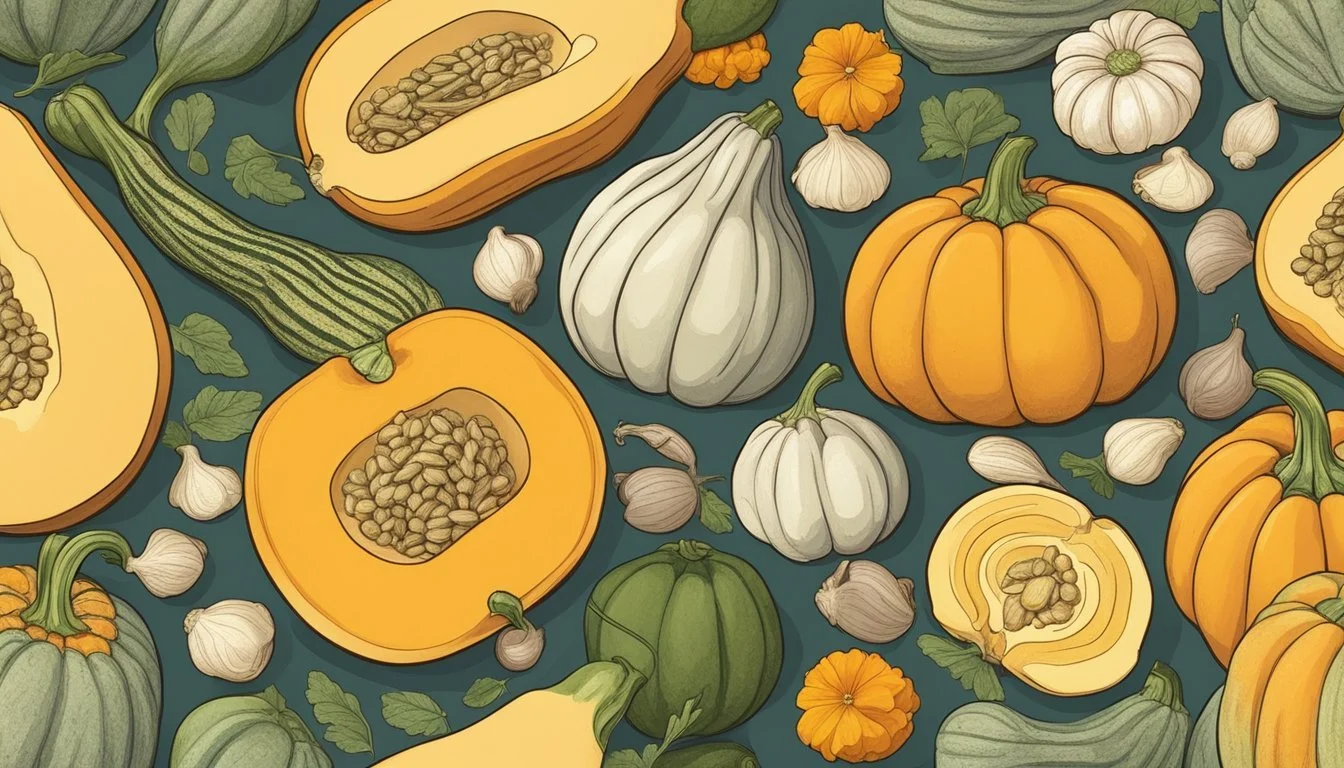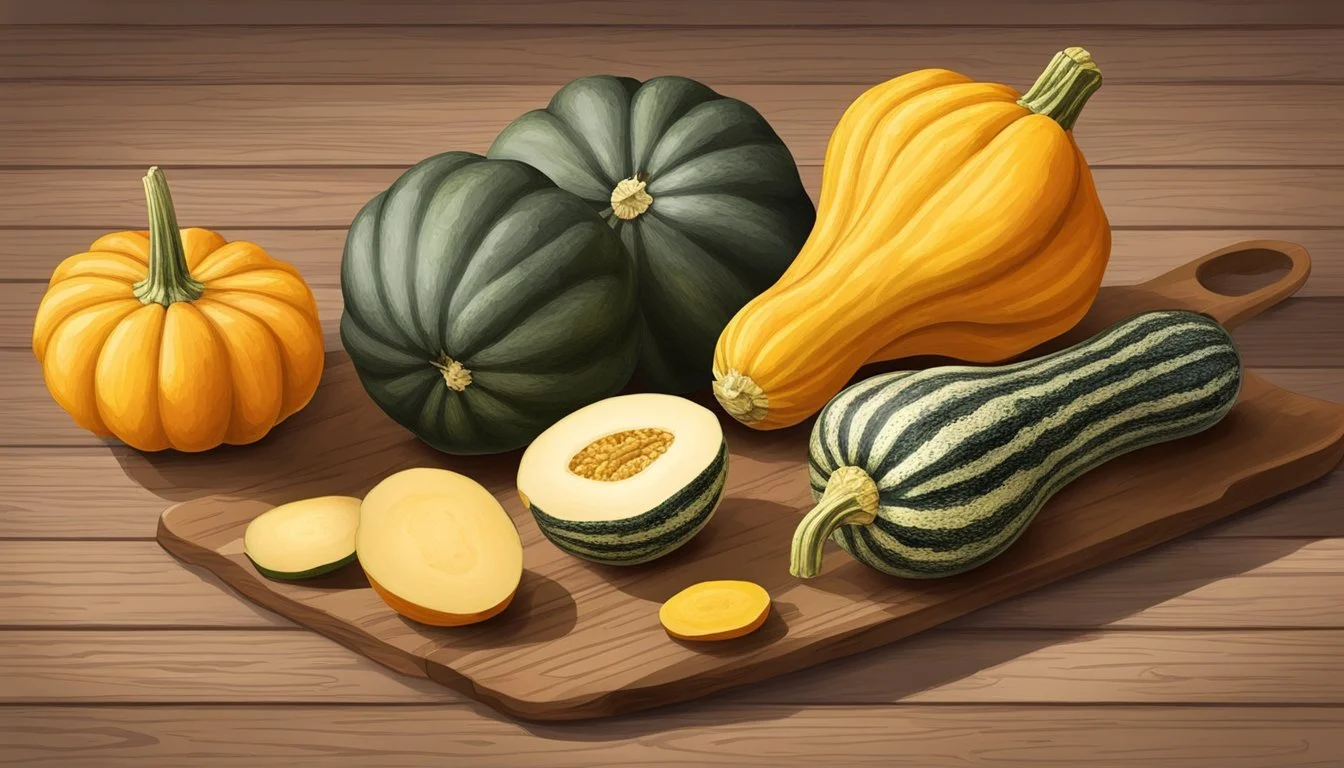Buttercup Squash Substitutes
Top Alternatives for Any Recipe
When it comes to cooking with buttercup squash, having reliable substitutes can be a game changer. Kabocha squash, known as Japanese pumpkin, offers a sweet, nutty flavor and a dense, bright orange flesh that becomes smooth and creamy when cooked, making it an excellent alternative. This squash can be seamlessly swapped into various recipes, ensuring you're never stuck without a viable option.
Sweet potatoes also make a practical substitute for buttercup squash. While they are higher in calories and carbs, their sweet flavor and versatility in dishes like stews and roasts are undeniable. For those who prioritize nutrition, sweet potatoes provide a significant boost in Vitamin A and fiber, making them a healthy stand-in.
For a more unique option, Delicata squash can be considered. It has a smaller size and a sweeter taste, which may require slight adjustments in quantity but works well in many recipes. With their similar cooking times and diverse cooking methods, these substitutes ensure that your culinary creations remain delicious and nutritious.
Understanding Buttercup Squash
Buttercup squash is a versatile vegetable known for its sweet taste and creamy texture. The sections that follow will explore its characteristics, nutritional profile, and culinary uses.
Characteristics of Buttercup Squash
Buttercup squash has dark green skin often with lighter streaks, and a distinctive turban shape. The flesh inside is a vibrant orange. Known for its sweet taste and creamy texture when cooked, it can be used in many types of recipes. This squash is cultivated primarily in the fall and stored well into the winter months. Measuring about 3-5 pounds each, buttercup squashes are usually smaller than other winter squash varieties.
Nutritional Profile
Buttercup squash is a nutrient-dense food. It is rich in fiber, which aids digestion and promotes a feeling of fullness. In terms of vitamins, it is an excellent source of Vitamin A and Vitamin C, both essential for immune function and skin health. It also contains notable amounts of potassium, which is important for maintaining healthy blood pressure. A serving of 100 grams has around 40-50 calories, making it a low-calorie option that can be included in various meal plans.
Nutrient Amount per 100g Calories 40-50 Vitamin A High Vitamin C High Fiber High Potassium Moderate
Culinary Uses
Buttercup squash can be prepared in numerous ways due to its versatile nature. It can be roasted to enhance its natural sweetness or steamed for a more subtle flavor. This squash is perfect for hearty dishes like curries, stews, and casseroles. It also works well in soups and risotto. Due to its sweet flavor, it can be used in desserts and pies. For a unique treat, try it stuffed with grains or used as a side dish. Its creamy texture also makes it an excellent ingredient for dips and spreads.
Common Substitutes for Buttercup Squash
In recipes calling for buttercup squash, several other types of winter squash and root vegetables can serve as suitable replacements. Each substitute varies in flavor, texture, and nutritional value, ensuring you can find the perfect match for your culinary needs.
Butternut Squash
Butternut squash is a favored substitute due to its similar texture and nutty flavor. With a smooth and dense flesh, it can seamlessly replace buttercup squash in soups, stews, and roasts. It's slightly sweet, making it versatile for both savory and sweet dishes. Butternut squash also boasts high nutritional value, containing substantial amounts of vitamins A and C, fiber, and potassium.
Acorn Squash
Acorn squash presents another winter squash variety with a tender and slightly sweet flesh. While it is smaller than buttercup squash, it works well in most recipes that require baking or roasting. The edible skin of the acorn squash adds a convenient element to the dish. Additionally, its rich nutritional benefits include fiber, vitamin C, and B vitamins, promoting overall health.
Hubbard Squash
Hubbard squash, known for its large size and sweet flavor, can readily substitute for buttercup squash in hearty dishes. Its dense and starchy flesh matches well in texture, offering a similar nutty flavor when cooked. It is particularly suitable for purees and soups, providing a creamy consistency. Nutritionally, Hubbard squash is packed with vitamins A and C, along with fiber and potassium.
Pumpkin Varieties
When considering pumpkin varieties, either sugar pumpkins or pie pumpkins make excellent substitutes. Their sweet and slightly earthy flavor fits well in both savory and sweet dishes. Pumpkin puree is especially suitable for soups, pies, and baked goods. These pumpkins are nutritious, delivering high levels of vitamin A, antioxidants, and dietary fiber, enhancing the nutritional value of the meal.
Other Winter Squash Varieties
Other substitutes include delicata squash, kabocha squash (Japanese pumpkin), and sweet dumpling squash. Delicata squash's tender flesh and edible skin make it easy to prepare, while its sweet flavor is perfect for roasting. Kabocha squash, with its smooth and creamy texture when cooked, is ideal for soups and roasting. Sweet dumpling squash is smaller but offers a sweet, nutty flavor suitable for various dishes. These varieties provide a good balance of dietary fiber and vitamins.
Sweet Potatoes and Root Vegetables
Sweet potatoes, carrots, and parsnips are viable alternatives due to their nutritional benefits and sweet taste. Sweet potatoes are especially nutrient-dense, packed with fiber, vitamins A and C, and potassium. Carrots and parsnips can add a sweet and earthy flavor to the dish. They are best used in roasted or mashed preparations where their natural sweetness complements other ingredients. These roots also provide a substantial amount of dietary fiber, enhancing the healthiness of your meals.
Alternative Ingredients for Specific Recipes
Finding an appropriate substitute for Buttercup squash involves considering the recipe type and the specific qualities needed. Whether it's enhancing soups and stews, achieving perfect roasting results, or crafting delightful pie fillings, there are multiple viable options.
In Soups and Stews
When replacing Buttercup squash in soups and stews, Kabocha squash is an excellent alternative owing to its sweet, nutty flavor and smooth texture which complements hearty dishes. Sugar pumpkin and pumpkin puree also work well, providing a similar creamy consistency. Root vegetables like sweet potatoes and carrots add natural sweetness and a slightly different, yet pleasant, texture.
Delicata squash can be used though its milder flavor might require additional seasoning. It's essential to note that different vegetables have unique cooking times; adjusting them ensures the best texture and taste.
For Roasting and Baking
In roasted dishes, Japanese pumpkin (Kabocha) and Delicata squash shine due to their firm texture and pronounced sweetness which caramelizes beautifully when roasted. Banana squash is another option; its large size and firm flesh make it ideal for roasting.
Pumpkin puree can also serve in baked ingredients, providing moisture and a subtle sweetness. Sugar pumpkin offers a straightforward swap, although it’s less sweet than Buttercup squash. Adjusting cooking times and seasoning can help replicate the desired flavors and textures.
As Pie Fillings
For sweet dishes like pie fillings, Sugar pumpkin and Japanese pumpkin stand out due to their inherent sweetness and smooth, buttery texture. Kabocha squash can be pureed to achieve a creamy, thick consistency perfect for pies. Pumpkin puree is a convenient alternative, especially as it’s often pre-seasoned for pie fillings.
Delicata squash, with its mild sweetness, can be used though it might need additional sweeteners or spices. Adding spices like cinnamon, nutmeg, or ginger can enhance the flavor, ensuring the pie meets the desired taste profile.
Considerations When Choosing Substitutes
When choosing substitutes for buttercup squash, it's important to consider aspects such as flavor, texture, nutritional content, and availability. These factors ensure that the substitute aligns well with the original squash in various recipes.
Flavor Profile Comparison
Buttercup squash is known for its sweet, nutty flavor with earthy undertones. When selecting a substitute, kabocha squash and sugar pumpkins are excellent choices due to their similar sweet and nutty tastes.
Acorn squash offers a milder sweetness but still carries a nutty essence, while delicata squash is sweeter and less nutty. Preferences may vary based on the specific flavors desired in a dish, such as salads or purees.
Texture and Consistency
The texture of buttercup squash is dense and creamy when cooked, which is crucial for many recipes. Kabocha squash also achieves a creamy texture, making it a suitable replacement in soups and purees.
Acorn squash tends to have a tender but less creamy consistency. Delicata squash is softer and cooks faster, affecting the texture of dishes like casseroles. Texture adjustments may be necessary depending on cooking methods.
Nutritional Equivalents
Buttercup squash is rich in vitamins A, C, and E, along with dietary fiber and minerals such as potassium and manganese. Substitutes like kabocha squash share similar nutritional profiles, offering high levels of vitamins and fiber.
Acorn squash and sugar pumpkins provide substantial fiber and vitamins, though their mineral content may differ slightly. Checking the nutritional equivalence ensures that dietary benefits are maintained in recipes.
Cooking Time and Method
Most buttercup squash substitutes have comparable cooking times. Kabocha squash and acorn squash can be baked, roasted, or steamed, generally in about 20-30 minutes.
Delicata squash cooks more quickly, often in 15-20 minutes due to its smaller size and tender texture. Adjusting cooking times and methods is important to preserve the desired consistency, particularly in time-sensitive recipes like stews.
Availability and Seasonality
Buttercup squash and its substitutes are primarily fall and winter vegetables, available in grocery stores during these seasons. Kabocha squash and acorn squash are also widely accessible in South Africa and other regions during colder months.
Sugar pumpkins may be less common outside the autumn harvest season. Planning recipes based on the seasonal availability ensures that substitutes are fresh and comparable in quality to buttercup squash.





